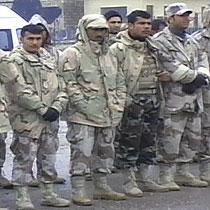2007年VOA标准英语-Iraqi Army Soldiers From the Kurdish North Head(在线收听)
By Jim Randle
Baghdad
16 February 2007
watch Iraq Kurd Troops
Iraq's army is moving more troops into Baghdad as part of the new effort to stop sectarian violence there. The controversial plan includes bringing Iraqi Army units to the capital from the Kurdistan region of northern Iraq. Some critics of the plan oppose adding Kurds to Baghdad's volatile ethnic mix. VOA's Jim Randle reports from Baghdad.

Iraqi Kurd troops
It is part of the new strategy to bring tens of thousands of additional Iraqi and U.S. troops into the capital to quell sectarian violence that U.N. officials say killed 94 Iraqis a day last year, mostly in Baghdad.
U.S. and Iraqi Army troops recently fought to clear militants out of one key neighborhood. It is the sort of rough going that Iraqi Army units from the Kurdistan region could face once they get here.
Much of the violence in Baghdad grows out of a sectarian conflict between Shi'ite Muslim Arab militias and Sunni Muslim Arab insurgents. In response, Iraq's government is bringing in thousands of troops from around the country, including the northern part of the country that Kurds call home.
Iraq's Kurds are mostly Sunni Muslims, but they differ ethnically and linguistically from their Arab countrymen. Saddam Hussein's Sunni-dominated government persecuted the Kurds, killing more than 180,000 of them in the 1980s.
Some Kurds oppose the deployment and want no part of a conflict between Sunnis and Shi'ites. They say it is an internal fight among Iraqi Arabs, not worth dying for if you are an Iraqi Kurd.
Other critics point out that most Kurdish soldiers do not speak Arabic, making it difficult to communicate with the communities they are trying to patrol. News reports say some Kurds have even deserted their units rather than get into this conflict.
But Colonel Said Hazan, the commander of an Iraqi Army battalion made up mostly of soldiers from Kurdish areas, expresses no doubts about his troops. He says they are ready to go to Baghdad, or anywhere else, and do their duty for Iraq. "Most of these soldiers are experienced fighters who were once part of the fierce Kurdish militia called the Peshmerga.
But a Sunni member of Iraq's parliament, Omar Al-Juboori, says the key to success is whether the troops from Kurdish areas work as part of Iraq's national army, not as Peshmerga. “If they are working under the Iraqi Army, then sending them to Baghdad to quell the violence is a good idea. But if they come representing only the Kurds, acting as Peshmerga, that would be bad,” he said.
A Shi'ite member of Parliament, Shatha Musawi, says this is a "daring step" for the Kurds. "The Kurds will be neutral when they patrol Baghdad's streets, and not favor either Sunnis or Shi'ites."
Some Kurdish members of Iraq's parliament also support sending troops from the north to help bring order to Baghdad. They argue that it is important to bring peace to Baghdad, because it is the capital of all of Iraq, not just the Arab parts.
Iraqi Army troops on the way to Baghdad face some logistical and organizational problems. In one recent case, marksmanship training had to be put off due to a lack of ammunition. Just the same, the U.S. general in charge of training Iraqi soldiers says the troops, like these officer candidates from the Kurdish north, will do "very well."
Another U.S. officer says the training will focus on larger units learning to work together smoothly and polishing urban warfare skills needed for the difficult task of patrolling Baghdad's very dangerous streets